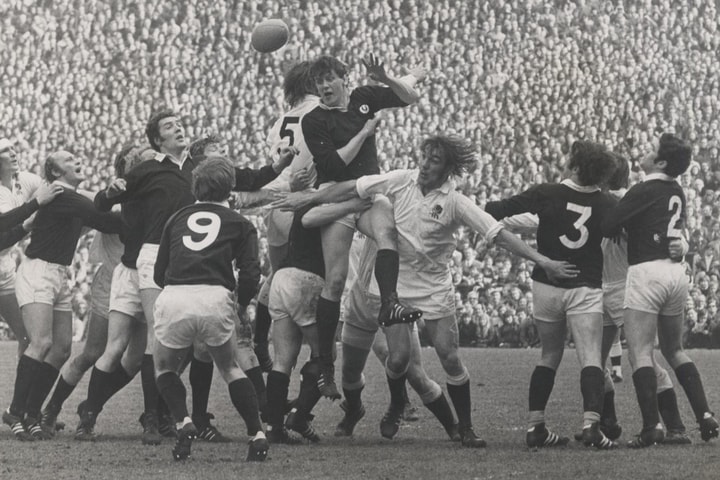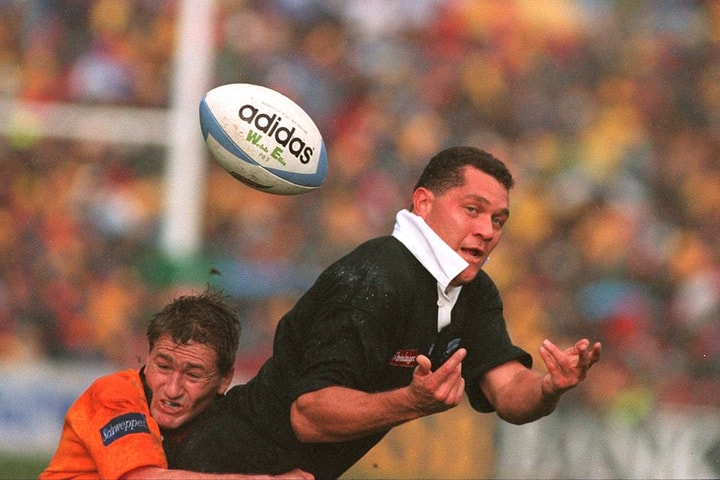Sixty years ago England ended the Five Nations tournament as champions after a match against Scotland at Twickenham in which fly half Richard Sharp scored a celebrated try shortly after half-time. The England and British Lions full back John Wilcox kicked the conversion and there was no further scoring leaving England as narrow winners by 10 points to 8. Most unusually in those times, it was not the end of England's international season.

From The Vaults

1963 Tour
An England tour party embarked on an historic tour of New Zealand and Australia in May and June 1963. The tour comprised five matches in New Zealand including two tests and finished with a test match against Australia. Five of the players who had won the championship were unable to tour including Richard Sharp, but the tour party contained some notable English stalwarts.
The centres, Mike Weston and Malcolm Phillips; the fly half Phil Horrocks-Taylor, a British Lion in New Zealand in 1959 and scrum half Simon Clarke; one of the great English front rows with Ron Jacobs and Coventry's Phil Judd propping his club mate Bert Godwin; the future England coach Mike Davis in the second row and the irrepressible Budge Rogers, a 1962 Lion in South Africa, at wing forward would have stood out in any era.
The tour began well. Up against a Wellington provincial side packed with All Blacks, uncapped Northampton and Cornwall full back Roger Hosen kicked magnificently to score 11 points in a surprise 14-9 victory. Otago reversed the scoreline four days later but England approached the first test against New Zealand in good heart on May 25th 1963 at Eden Park, Auckland. There were three new caps in the England side - full back Roger Hosen and John Ranson, the speedy winger from Rosslyn Park, in the backs and Vic Marriott of Harlequins at wing forward.
The All Blacks were formidable opponents. Unbeaten in their previous eight tests, their game was based on a rugged forward power under the shrewd captaincy of their prop Wilson Whineray supported by the legendary second row forward Colin Meads. A fast and skilful back row of Waka Nathan, John Graham and Kelvin Tremain, one of the great try poachers, added extra menace.
A strong performance by the English pack saw them lead 6-0 at half-time through two penalty goals by Hosen but the second half belonged to the giant All Black full back Don Clarke. Clarke kicked a penalty just after half-time but Ranson then scored a debut try which Hosen converted to give England an 11-3 lead. Before England had time to raise their hopes of victory, Don Clarke grabbed the game by the scruff of the neck and winger Ralph Caulton scored two tries. In the final thirty minutes of the match, Clarke scored a further 12 points from a try, three conversions and a drop goal to become the first All Black to record a "full house" in an international. England had played bravely but the strength of the All Black pack allied to Clarke's boot ultimately ensured a decisive victory by 21 points to 11.
The tour moved on to Hawke's Bay where the England side were heavily defeated 20-5 by a typically strong New Zealand provincial side. This left them four days to prepare for the second test at Lancaster Park, Christchurch on June 1st in front of 40,000 spectators. The selectors made two changes and brought in Northampton's veteran winger Frank Sykes, a 1955 Lion in South Africa, eight years after winning his first two caps. The Coventry back row forward Brian Wightman who had played two matches in the championship came in at number 8 with David Perry moving into the second row in place of another Coventry forward Tom Pargetter.
The changes worked and England very nearly pulled off one of the great coups in rugby history. It was expected that the All Blacks in their 500th match would improve on their first test display and put England to the sword, but after 74 minutes the score was 6-6 and England were hanging on with everything they had. The All Black threequarters had scored two tries in the first half to a Hosen penalty and shortly after half-time centre Malcolm Phillips finished off a 75-yard move and touched down in the corner. Hosen couldn't convert to give England the lead and his opposite number was waiting for his moment. It came with just five minutes of the match remaining.

Don Clarke
Don Clarke caught a wayward clearance and claimed a mark on halfway near the left touchline. Clarke himself described what happened next:
"One England player was telling the other to charge the instant I moved towards the ball. They didn't appreciate that they couldn't advance until the ball was placed on the ground and I had my brother Ian (the All Black prop) holding it six inches above the ground. So I took one step forward and paused. The three of them charged, and I protested to the referee who correctly awarded me a free kick."
It still required a monumental kick to win the match but there have been few greater marksmen than Don Clarke. With unerring accuracy he kicked the only goal from a mark in the history of All Black versus England matches and, although Hosen had a late chance to draw the game by kicking a penalty, England's brave effort had failed at the last leaving New Zealand 9-6 victors.
There remained one test to play a week later against the Wallabies at the Sydney Cricket Ground. Heartened by their performances in the two tests against the All Blacks, the selectors picked an unchanged England side. The conditions were awful but a young Australian side led by experienced second row forward John Thornett with four new caps played with great panache in the driving rain and raced to an 18-0 lead after 34 minutes.
The last of the four Australian try scorers was a New Zealand-born flanker making his debut after moving to live in Sydney earlier that year. Greg Davis would go on to win 39 caps, thirty of them consecutive, and captain Australia in 16 tests. He ended his international career against New Zealand in 1972 and tragically died from cancer seven years later just before his 40th birthday.
England pulled back two tries before half-time through scrum half Simon Clarke and hooker Bert Godwin but, for once on this tour, Hosen did not have his kicking boots on and three conversions went begging. A third try scored by Malcolm Phillips just after half-time took the score to 18-9. This appeared to set up the tour for a grandstand finish but the Australian defence was too strong and there was no further scoring.
It had been quite a tour with six high profile matches including three tests played in the space of 18 days. England had only won one of those matches but they had acquitted themselves remarkably given the tour schedule and the quality of the opposition.
Sources:
- The Book of English International Rugby 1871-1982 - John Griffiths (Willow Books 1982)
- They came to conquer Volume I 1884-1966 - Maxwell Howell et al (Howell-Xie Publishing Company 2002)
- Thorny Encounters - Matt Elliott (Pitch Publishing 2018)
- The Visitors - RH Chester & NAC McMillan (Moa Publications, Auckland 1990)
- World Rugby Museum international spreadsheets 1871-2020 (compiler: Richard Steele)

About The Author
A professional musician and arts administrator, Richard Steele has been on the committee of the World Rugby Museum at Twickenham since 2005 and is the co-author of the RFU's 150th anniversary book England Rugby 150 Years.




